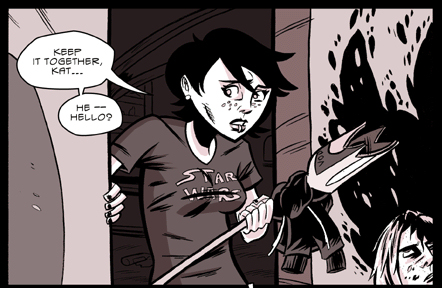Posted By John Sears on January 13, 2011
I was recently linked via Zombie Universe to this talk from 2009 by one Dr. Steven Schlozman, who teaches psychiatry at Harvard Medical School, as well as practicing childhood and adolescent psychology and lecturing at Harvard’s School of Education. A prestigious individual talking about an important and widely neglected, when not actively maligned, community, here and around the world.
How does he frame this landmark speech? Does he discuss the psychology of being an oppressed and persecuted class? Or perhaps delve into the issues that drive people to produce Anti-Zombie propaganda, and others to endorse it and take it up as their own cause?
No, none of these approaches were taken. Sadly, Dr. Schlozman spends his lengthy address talking about the psychological functioning of the Romero Stereotype Zombie, an entirely fictional creation by a uniquely disturbed (and disturbing) filmmaker and all-around Anti-Zombie mastermind.
Entitled ‘The Neurobiology, Psychology and Cultural Overtones of the Zombie Film Genre’, Dr. Schlozman’s speech prefaced the screening of Night of the Living Dead for the “Science on Screen” lecture series at the Coolidge Corner Theatre. Given the title and the obvious focus on one particularly unfortunate yet still historically significant film, we at the ZRC were willing to grant a great deal of leeway and listened to the entirety of Dr. Schlozman’s address. Would he deconstruct the myths and hatred surrounding this seminal work, the way modern film scholars sometimes discuss, say, ‘The Birth of a Nation’?
Once again, sadly, that was not the purpose of this talk. Instead, Dr. Schlozman seeks to extract, from Romero’s own self-contradictory and confusing series of Anti-Zombie films, a sort of Unified Theory of Zombie Prejudice, and along the way, an arbitrary standard of what is, and is not, a Zombie, utilizing a combination of observations of the films and his own personal preferences and theories.
Although the discussion was framed as being limited to Romero’s oeuvre, it becomes clear that, like many ‘Zombie Enthusiasts’, Dr. Schlozman draws most of what he considers to be a Zombie in general from Romero, and specifically, from earlier Romero films (Night, Dawn, Day, but not Land, Diary or Survival). That’s not a bad idea if you want to maintain consistency, but it misses out on the gradual evolution of even Romero’s retrograde depiction of the Differently Animated. For example, in Land of the Dead, Zombies are shown organizing an amphibious invasion of an armed and defended island, launching a retaliatory strike, and then organizing a safe and swift withdrawal from combat, all while limiting themselves to a roughly proportional response. These are highly sophisticated maneuvers that, it must be said, superpower nation-states often find themselves unable to achieve.
Those later, somewhat less unkind depictions would severely undermine the core of Dr. Schlozman’s theory for ‘Zombie Neurobiology’, which basically consists of the notion that Zombies have suffered severe damage to several regions of their brain, which result in the stereotypical behaviors Romero often depicts. Dr. Schlozman proposes that Zombies lack ‘executive functioning’ due to a disconnect between the center of primal desires in the brain (like fear, lust, rage) and the frontal cortex, the area governing higher thought. He theorizes that the stereotypical ‘zombie gait’ is due to damage to the cerebellum, and that the seemingly insatiable hunger of Romero Zombies is due to damage to the ventro-medial hypothalmus, which governs the feeling that one is full after eating. (He notes, but fails to connect, the fact that in lab animals such damage apparently leads to hyperactive metabolisms and feverishness; Zombies, by contrast, are usually predominantly ectothermic, even in films).
(A good summary of his theory of Zombie neurobiology can be found here from io9).
Of course, as mentioned above, this explanation falls apart even limited to Romero’s films; for Romero, Zombies are capable of learning, planning, and evolving, even educating themselves over time; they actually have quite sophisticated ‘Executive functioning’, as mentioned above, by “Land of the Dead”, as they outfight and outwit an entire, heavily armed ‘Survivor’ population with relative ease.
They also possess the capability, even for Romero, of limiting their ‘insatiable’ hunger. Witness ‘Bub’, in ‘Day of the Dead’, who is capable of refraining from eating a living human directly in front of him, and seemingly mourns over his murdered Mad Scientist/mentor, without eating him, then going so far as to purposefully exact revenge upon his mentor’s killer (whose identity he had to first deduce).
I’d call that ‘Executive functioning’.
Of course, one can chalk those inconsistencies up to George Romero as much as anyone. Perhaps his position vis a vis Zombies is softening with age, or perhaps, as more than one aficionado of his movies has speculated, Zombies within the Romero-verse evolve over time, gradually becoming more ‘human’. Who can say? It’s not hugely relevant to the target audience, ever eager for more violent Anti-Zombie ‘fun’, and it’s not hugely relevant to The Zombie Rights Campaign, at least until Romero’s position has evolved to a point where he’s willing to consider non-violent solutions (at a bare minimum).
It is however worthwhile to point out to fans of these works, who often allow this cinematic formula to define their conception of the Undead, that it, in fact, has changed greatly over time both from our perspective and within the chronology of the Romero-verse.
Perhaps more useful to The Cause were Dr. Schlozman’s observations on both why the Survivors in these films so frequently turn upon one another, and why Zombie movie fans care for the films the way they do. Dr. Schlozman speculates that empathy, which may be neurobiological in origin (see his discussion of mirror neurons), is constantly frustrated in Survivors both by the presence of nearly psychotic fellow Survivors and by the Differently Animated, who, by appearing quite similar to Living people while acting very unlike them (in Romero movies, many comics and much of the post-Romero fiction) cast the brain into confusion and anger. Eventually, he believes, there comes a point where Survivors snap and attack the Differently Animated to vent their primal inability to cope with the new state of the world.
Could this be true, within the fictional settings described? It’s not really our place to say; our concern is with the implications for the real world. If Dr. Schlozman is correct, then violence against the Differently Animated is inevitable unless reconciliation is reached between the Living and the Undead. Fortunately, this is precisely our goal, and hopefully his as well.
Dr. Schlozman also has something interesting to say about the relationship between a fan’s enjoyment of these movies and his or her own sense of empathy:
Schlozman suggests that mirror neurons also help explain the popularity of the zombie genre among the living. While watching these movies, “we like the permission to look at these things that look human – but aren’t human – and have utter and complete permission to blow their heads off.” In other words, we get off on the thrill of guiltless violence. We enjoy a brief vacation from empathy, and take our crocodile brains out for a spin.
…
But the fun lasts only up to a point. As the movies progress, Schlozman says, we start to feel uncomfortable with the loss of our humanity-that we are “so willing to forsake those mirror neurons.”
The cost of the ‘fun’ to be found in oppressing the Differently Animated is the sacrifice of one’s own humanity, a piece at a time.
Not a shocking conclusion for the ZRC, but many people would surely be surprised by it.
What, in summary, can we learn from this presentation?
1) That the internally inconsistent or evolving Romero canon is still used to this day to define, and redefine, the Differently Animated despite our best efforts
2) In the event of an actual ‘Zombie Apocalypse’ the Survivors are essentially doomed to failure in any prolonged military struggle due to psychological breakdown
3) The perverse enjoyment of Anti-Zombie films exacts a terrible cost upon real-world Living viewers, who suffer wounds to their own personal sense of empathy and their connections to their fellow humans, both Living and Undead alike
While we firmly disagree with the actions in point 1, points 2 and 3, we would hope, lend weight to The Zombie Rights Campaign’s strategy of nonviolent, peaceful engagement between the Living and Differently Animated communities. After all, if the body of work found in Anti-Zombie film, and the observations of modern neurobiology teach us anything, it is that without such engagement with our fellow human beings, we are surely doomed as a species, Apocalypse or not.
Category: Zombie Media |
No Comments »
Tags: Movies, Romero, Science, Social Justice





